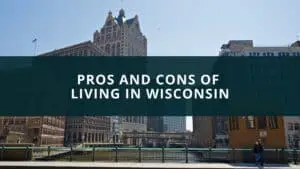Are you thinking of moving to Kenosha? First, you should know more about one of the largest cities in Wisconsin and the Lake Michigan area. So, what’re the pros and cons of living in Kenosha?
Residents of Kenosha are proud of its outdoor amenities, ideal location, light traffic, museums, living costs, and safe neighborhoods. However, there are drawbacks that might make you doubt whether you should even stay here. They include work commute, economy, and poor standards of public schools.
Regardless of these negatives, Kenosha still attracts thousands of people to it. But it’s always best to have a complete idea of what you’re getting into before you start. That’s what this article shows you.
Quick navigation
Pros Living in Kenosha
Kenosha has many perks that residents get to enjoy. These include
1. Outdoor Amenities
If spending time outside is your thing, you should choose a place with everything you need to stay outdoors. Kenosha is that kind of place. The city has several parks where visitors can hike, bike, have a picnic, and connect with nature as they want. Lake Michigan is also here, which means water activities are very much welcome. Boating, fishing, swimming, sailing, etc., are all everyday activities in these parts.
We can’t forget to mention the several golf courses in the city. So, if you’re into golf or plan to learn, Kenosha has the facilities to make that easy for you.
2. Driving Distance to Major Cities
Kenosha is ideally located between Chicago and Milwaukee. Thus, residents of this city have access to both much bigger cities. The two bigger cities are also very accessible using different modes of transport. For instance, Milwaukee is only 41 minutes away by car, and you can also take the train. On the other hand, Chicago is 70 minutes away by car.
Most residents of Kenosha take advantage of its proximity to other cities by getting better-paying jobs in these cities. This is something you can also do when you move to Kenosha.
3. Light Traffic
Getting around Kenosha is easy due to the absence of traffic on most days. The average one-way commute time in the city is about 24 minutes which is below the national average. The transportation system is minimal, but the ones available are quite efficient. Kenosha has a streetcar system operating between HarborPark and Downtown. The only Metra station in Wisconsin is also here. Kenosha has a walk score of 45 and a bike score of 49. These numbers suggest that it’s slightly walkable and bikeable. Particular neighborhoods are far better than others in this regard.
4. Museums
Kenosha is home to fantastic museums, both general and specialty museums. The Dinosaur Museum is here and contains the largest set of carnivore dinosaur skeletons in the country. Also, the Kenosha public museum contains the largest collection of Wooly Mammoth bones.
Just beside the Public Museum is the Civil War Museum. It’s the second biggest of such museums in the country and one of the three venues in the US with a 360-degree film experience. So, if museums are your thing, then staying in Kenosha would be like hitting a goldmine for you.
5. Living Costs
Another reason to move to Kenosha is its affordability. The cost of living index places it at 88.1, which means you’ll spend $88,100 to live here compared to the $100,000 you’d have to spend on average in the US. Living in a cheap City means you can easily make ends meet.
Even though the prices of homes have significantly increased, the average value of a home in the city is $202,621, which is still below the national average.
6. Safe Neighborhoods
When picking where to live, certain attributes could be deal-breakers. Security is one of them. No one wants to live in fear. So, it’s only logical to go for a place where your safety is guaranteed. Kenosha is a place like that. The total crime rate is 24% below the national average, and property crime is 25% lower. In the same vein, violent crimes are 18% lower.
With crime occurrence being 18.88 per 1000 people, the chance of being a crime victim in Kenosha is 1 in 53. Therefore, the city is safer than 39% of places in the US.
Cons of Living in Kenosha
There are pitfalls to staying in Kenosha. If anything, knowing these pitfalls help you avoid or manage them as you deem necessary. At least, nothing will catch you by surprise once you move.
1. Work Commute
With over 40% of residents of this city working in other Places in Illinois and Wisconsin, the number of people who travel to work is very high. If you’re moving into the city, you’re likely going to be doing some traveling to work too. So, if you’re not willing to travel as far as Chicago or Milwaukee daily for work, Kenosha might not be ideal for you. There are trains along various routes, of course, making the commute a little easier.
2. Economy
Most of those who commute outside Kenosha for work do so because of better opportunities and wages. This isn’t surprising considering the state of the economy in the state. Kenosha’s economy isn’t so strong as that of major cities close to it, i.e., Chicago and Milwaukee. The median household income is below the US average, and the poverty rate is 16%. However, the unemployment rate is relatively similar to the national average. For example, it had a 5.50% unemployment rate in July 2021. The US average for that same month was 5.4%.
3. Low Public Schools Standards
K-12 public schools in the city are victims of underfunding that affects the quality of education. In Kenosha, the average test score of students is 37% which is far from the 49% US average. It’s even lower than Wisconsin 47%.
It’s almost like residents of K-town don’t take going beyond high school seriously. The percentage of those who hold a bachelor’s degree in the city is 22.9%. With the education standards here, you might want to think twice if you’re moving with kids. However, there are still few great schools in the city. The challenge is getting your kids into these schools.
In Conclusion
With an excellent livability rating of 76, Kenosha is an incredible city. It’s got many perks for residents, but you shouldn’t ignore its cons either. So, it’s up to you to decide.




